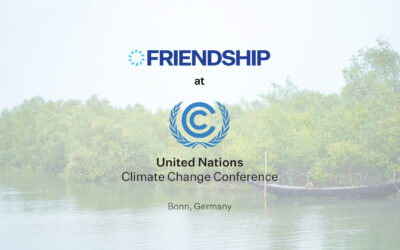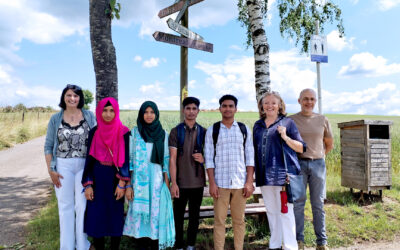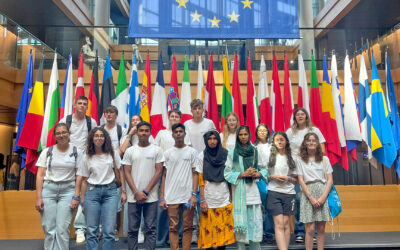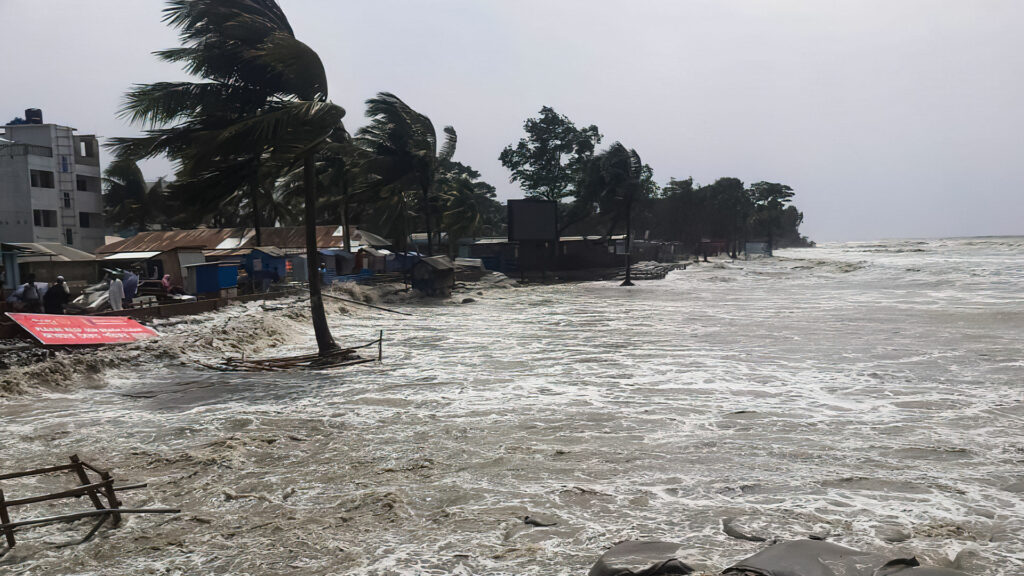
by Kazi Amdadul Hoque
November 7, 2022
On the bank of river Kholpetua in Bangladesh, a man sits still, his eyes fixated in the direction of the branches of a mangrove tree near the largest mangrove forest in the world, the Sundarbans. The searing heat does not move him, his gaze remains anchored on what looks like a makeshift wooden trap set underneath the tree to capture crabs. The trap moves a little, and the man rushes to catch his game. But he fails, the crab escaped. Disappointed, he returns to his previous position, hoping to find better luck the next time.
The man’s name is Subol Sarder. He lives in Nakna, a village of Protapnagar in Satkhira District. He depends on catching crabs for a living. His emotions revolve around his success of trapping crabs. On a good day, he makes 3-4 USD by selling the crabs he captures. On bad days, he may as well have to make do with one less meal.
Cyclone Amphan in May 2020 caused the collapse of the embankment on the river Kholpetua. The saline water destroyed the agricultural lands, the fish farms and the landscape. People are yet to recover from the loss of livelihoods. The recent mangrove afforestation in this area acts as a green embankment. Subol Sarder comes from a family of fishermen, who depended on the river for a living. He used to catch fish, but everything changed after river erosion consumed his home and forced his family to flee to the nearby village of Nakna and settle there. Without a land to farm on, and without any scope of returning to the river to catch fish, he now has to depend on catching crab for a living. This, as well, is not a sustainable livelihood source. If high tides sweep into the embankments, they take the crabs along, leaving Subol with nothing to feed his family with for days.
The story of Subol Sarder is not an isolated one. There are hundreds of thousands of Subol Sarders living in climate impacted coastal areas of Bangladesh. Their futures are uncertain, and their lives are dictated by the tide. They lose their homes to erosion and have their livelihoods and earning potentials hampered by salinity. With their backs to the wall, they often have no option than to venture into the forests to earn a living or cut down trees to make space for a home, causing deforestation and introducing environmental hazards. But what else do they do, to put food on the plate for their families? According to the Soil Resources Department Institute (SRDI), 83.3 million hectares of land was affected by salinity in 1973 in Bangladesh. The number rose to 102 million hectares in 2000, and to 105.6 million hectares in 2009. It continues to increase and extensively harm agriculture production. Food security will take a dark plunge because 30 percent of cultivable land is located in coastal areas.
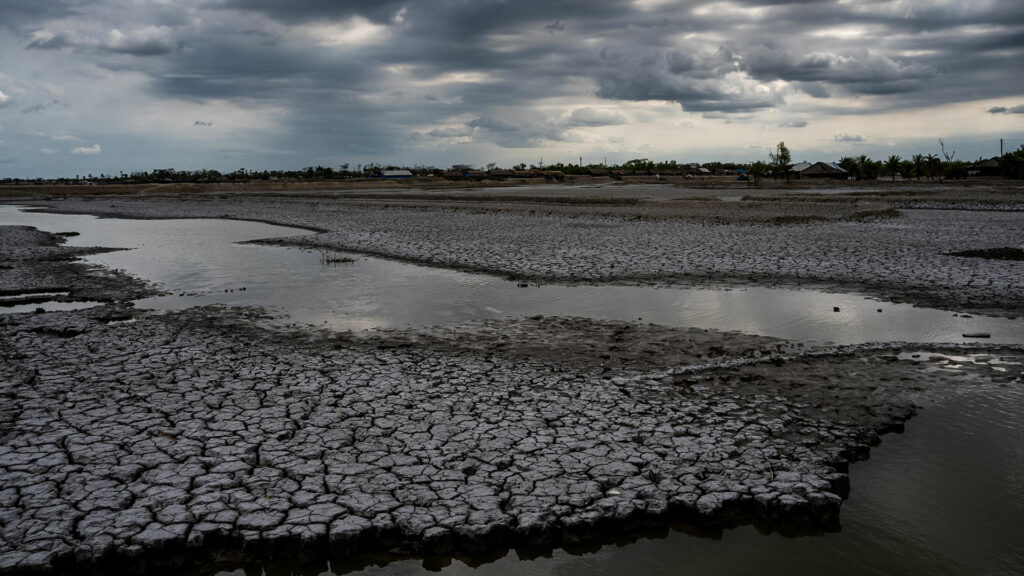
A report published by the International Centre for Diarrhoeal Diseases and Research, Bangladesh (ICDDR, B) in 2019 found that elevated blood pressure was prevalent in some Bangladeshi coastal communities and links salinity directly to increasing hypertension. This has not only contributed to major illnesses and deaths, but also infertility and failed pregnancies in women in the coastal south.
Even when climate impacted communities build a life with their hard-earned money, they lose everything when a disaster strikes and have to start from scratch.
This is where a climate financing scheme that directs funds towards the locals to adapt to their situation can play a part. According to a report published in 2021 by the International Institution for Environment and Development (IIED), the 46 least developed countries vulnerable to the impacts of climate change received less than 3% of the funds they need to adapt to climate change. Another research by IIED indicates only “10% of funding committed under international climate funds to help developing countries to take action on climate change is directed at the local level.” The lack of transparency in tracking where these funds go stops them from going to the right place, which are the local communities bearing the brunt.
Where marginalised and vulnerable communities are unable to protect their livelihoods, the private sector and corporations take full advantage, using important natural ecosystems such as mangrove forests to build business facilities. They make big profits from shrimp farming, taking opportunities away from locals who hold the true skills as farmers and fishermen, and contributing to environmental hazards. Business is essential for the economy; however, policies should be revisited to make private sector corporations comply with green business and pay their debts for excessive carbon footprint in the past. Financial institutions need reformation for this financial adjustment.
Developed countries in the recent past have pledged 100 billion USD to their developing counterparts for climate change adaptation. Last year, during the COP26, the countries committed to releasing the funds as early as possible to fund adaptation measures in the least developed countries. First of all, a large portion of the funds should reach the grassroot levels to boost development in the local communities, who are at the forefront. Second, there should be financing schemes, i.e., compensation and insurance, to help the people directly affected by the impacts of climate change. People like Subol Sarder should have opportunities to take interest-free or low interest loans, so that they able to establish a livelihood and recover from losses. They should be able to access the infrastructures and institutions – schools, healthcare facilities, etc., a system in place to help them with financial assistance.
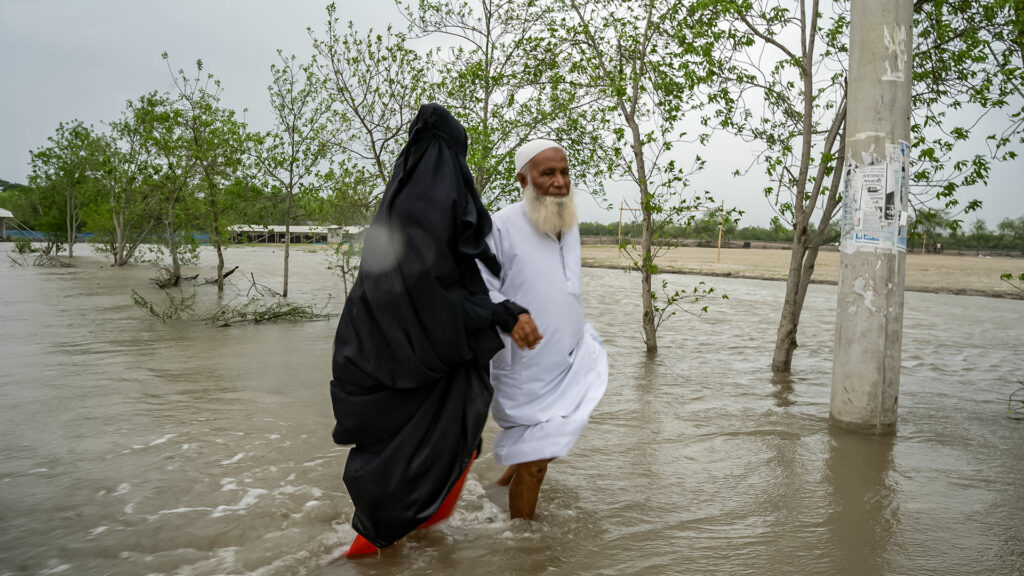
In addition, demarcations between development assistance and climate adaptation need to be specified and if merged, should be transparent and justified. Covid-19 taught us that a global crisis does not discriminate among races, adhere to borders and separate the rich from the poor. It affects everyone and global solidarity is needed to tackle it. Similarly, climate change is a global crisis. Shared responsibility is essential. We need to share resources, technologies and take responsibility. Climate Assistance is not a matter of contribution or compensation, but a matter of responsibility towards humanity and civilization. A responsibility that has to be shouldered by everyone, from individuals to corporations to governments. Every individual has to play their part by reducing wastage, consuming less energy, preserving non-renewable resources and reducing their carbon footprint to fulfil the pledge. Likewise, corporations and private sector companies have to reduce emissions and adopt green initiatives to promote eco-friendly business, governments have to create policies and ensure measures to preserve the environment and UN/International agencies have to make sure not only are voices of the vulnerable heard but actions are also taken.
This sense of responsibility towards climate vulnerable, least developed and developing countries has to be ingrained in the developed countries as well. Because at the end of the day, the average per capita consumption of power in Europe is 1.6MWh, whereas in Bangladesh, it is only 323KWh. An average person consumes 82 gallons (310 litres) of water in the US each day. In Bangladesh, an average person consumes only 83.17 litres of water each day. According to Centre for Global Development (CGDEV), rich countries are responsible for 79% of historical carbon emissions. So why would Subol Sarder, who has minimal carbon footprint, suffer the consequences of the actions of the richer, more developed nations?
Another important point of discussion is the 50:50 balance between mitigation and adaptation policy on allocation of financial resources that was accepted by global leaders at COP26. While mitigation practices will take time as they pass through a bureaucratic process to materialise, disbursal of adaptation funds should be accelerated and channelled to the grassroot communities and local stakeholders so that effective initiatives are taken for integrated adaptations and to prepare local communities for the paradigm shift that climate change will induce. Furthermore, long-term, sustainable and effective mitigation measures should be taken by policymakers to help people adapt to the impacts of climate change. Initiatives such as mangrove afforestation—that protects people and embankments from natural disasters, provides livelihood opportunities to communities affected by salinity and sequesters carbon—or increased reliance on solar power or developing raised structures to protect people from floods, may prove valuable.
Above all, global solidarity and a sense responsibility on climate change is crucial to leave a better world for our children.
Note: A version of this article was published on Dhaka Tribune, on November 9 that can be read at: https://www.dhakatribune.com/longform/2022/11/09/you-broke-it-you-fix-it


